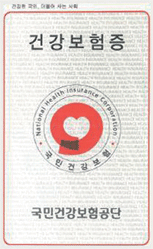전체메뉴
- Living in Korea
- Living in Korea
- Notice
- Notice
- Reference
- Free Online Learning
- Multicultural Family Support Center
- About the Multicultural Family Support Center

Korea implements a health insurance system wherein a person pays a certain monthly premium according to his/her income and assets.
Subscribers to the national health insurance can access medical services at a low price if they are sick, give birth, or simply want to have a regular medical check-up. All citizens are required to subscribe to the national health insurance, with the exception of beneficiaries of medical aid. Subscribers to the national health insurance system can be categorized into local subscribers and employee subscribers. All employees of businesses, employers, public officers and teachers are categorized as employee subscribers. Those whose livelihood depends on the income of employee subscribers may be registered as the subscribers' dependents if meeting the dependence requirements and income requirements as set forth in the Enforcement Decree of National Health. Other subscribers and the family members supported by employee subscribers are categorized as local subscribers.
For company subscribers, the company pays for 50% of the medical insurance fee (applies only for salaries taken from company), and individuals have to pay the remaining 50%. Individuals who have separate income exceeding 34 million won must pay the full insurance fee with 100% of the insurance rate applied, after 34 million won is deducted from the total income
When a health insurance policyholder receives treatment from a hospital, the National Health Insurance Corporation pays a portion of the medical fee. The policyholder can receive treatment from hospitals, medical centers, or oriental medical clinics. However, the other portion must be paid by the patient. There are also medical checkup benefits. The number of checkups provided will differ depending on age. Most people with insurance have a medical checkup every other year.
Foreign residents who are registered and work at businesses where employee subscriber policies are applied, or foreign residents who are appointed as public officers and teachers, are granted the status of employee subscribers. Foreign residents who are registered and who are not categorized as an employee subscriber or a dependent of an employee subscriber may gain the status of local subscribers upon request after having lived in Korea for three months or longer. For foreign residents who entered Korea after December 18, 2018, only those who have stayed in Korea for 6 months or more. From July 16, 2019, foreign residents who reside in Korea for more than six months will automatically obtain local subscriber qualification for national health insurance. Foreign residents who have not yet been in Korea for six months may subscribe to the National Health Insurance on the day of the entry to the country if there is a clear reason for a stay of more than six months, such as studies or marriage-based immigration
You may register as a dependent* on the spouse’s National Health Insurance. Submit documents confirming dependency to the National Health Insurance Corporation.
Required documents: A certificate listing you as your husband/wife’s dependent, a copy of your alien registration card, and a certificate of family relations (family relations certificate from a foreign country must be a document confirmed by the ministry of foreign affairs of the country (or Apostille) (including Korean translation))
※ According to the change in the health insurance fee charging system for foreigners and overseas Koreans, residents
with F-1 or F-2 status are subject to prepayment on the 25th day. (Effective January 2019)* When the status of the spouse is verified, regardless of the status of stay (F-6), the subscriber may join the household.
For detailed information on premiums, qualifications, and benefits of national health insurance, visit the National Health Insurance Corporation website or call the main number (☎1577-1000) or foreign language (English, Chinese, and Vietnamese) information service (☎033-811-2000).
The medical benefit system aims to subsidize medical fees for citizens who cannot pay medical bills due to financial difficulty. Foreigners are not qualified for medical benefits, with the exception of specific cases outlined in the National Basic Living Security Act. When a person who qualifies for this assistance undergoes medical treatment due to disease, injury or childbirth, the government pays the hospital or clinic fee.
Recipients of medical care assistance signified in the National Basic Living Security Act (including foreigners) are eligible for the medical allowance.
| Primary Recipients | Secondary Recipients |
|---|---|
| Recipients of national basic living security (households unable to provide labor services), men of national merit, people deemed intangible cultural assets, defectors from North Korea, people who were active in the 18 democratization movement, adopted children (under 18 years old), the homeless, etc. | Recipients of the National Basic Livelihood Security System (families that have family members who are able to work) |
| Classification | Primary Recipients |
|---|---|
| Hospitalization | Free of charge |
| Outpatient medical treatment |
|
| Pharmacies | 500 won (per prescription) |
| Classification | Secondary Recipients |
| Hospitalization | 10% of medical fees |
| Outpatient medical treatment |
|
| Pharmacies | 500 won (per prescription) |
Applicants should first apply for medical benefits at their primary medical benefit organization before applying at secondary medical benefit organizations and tertiary medical benefit organization (exceptions apply).